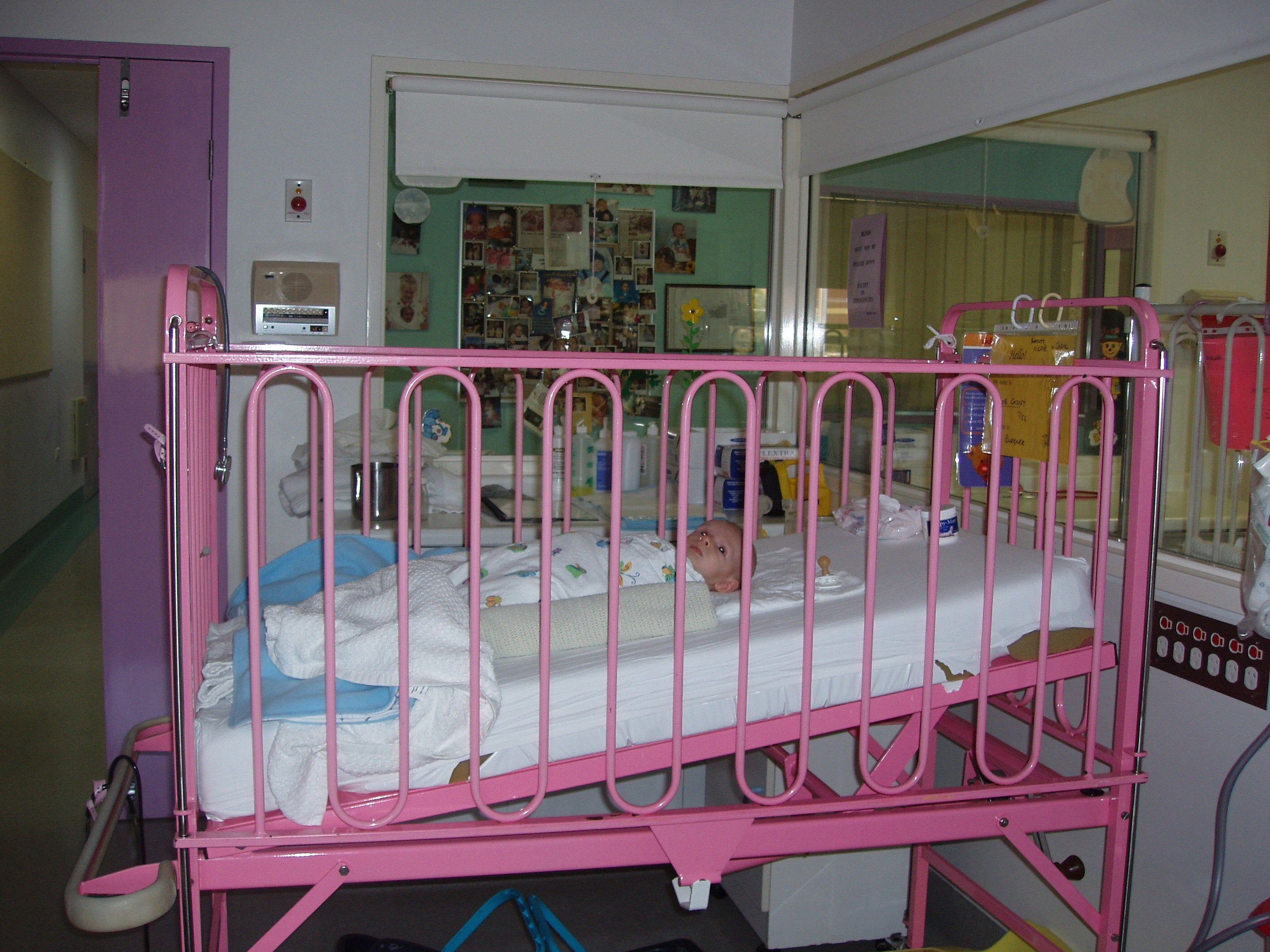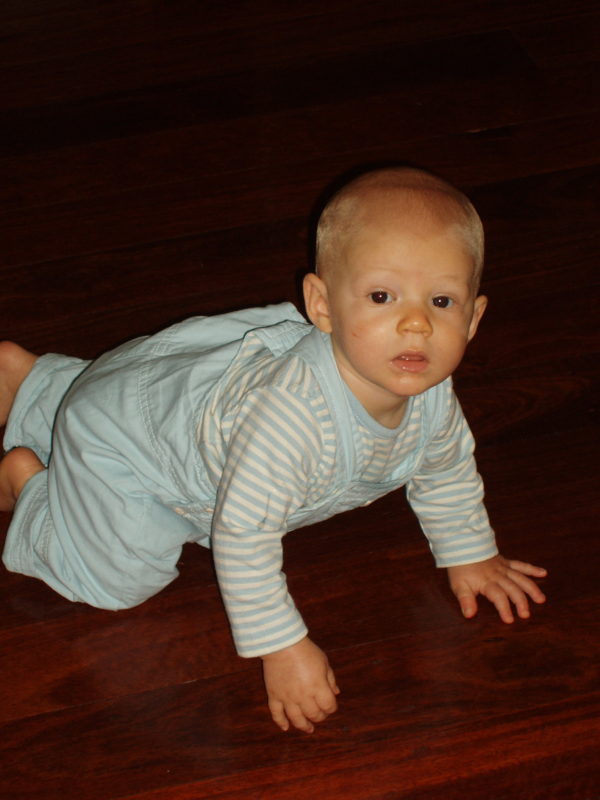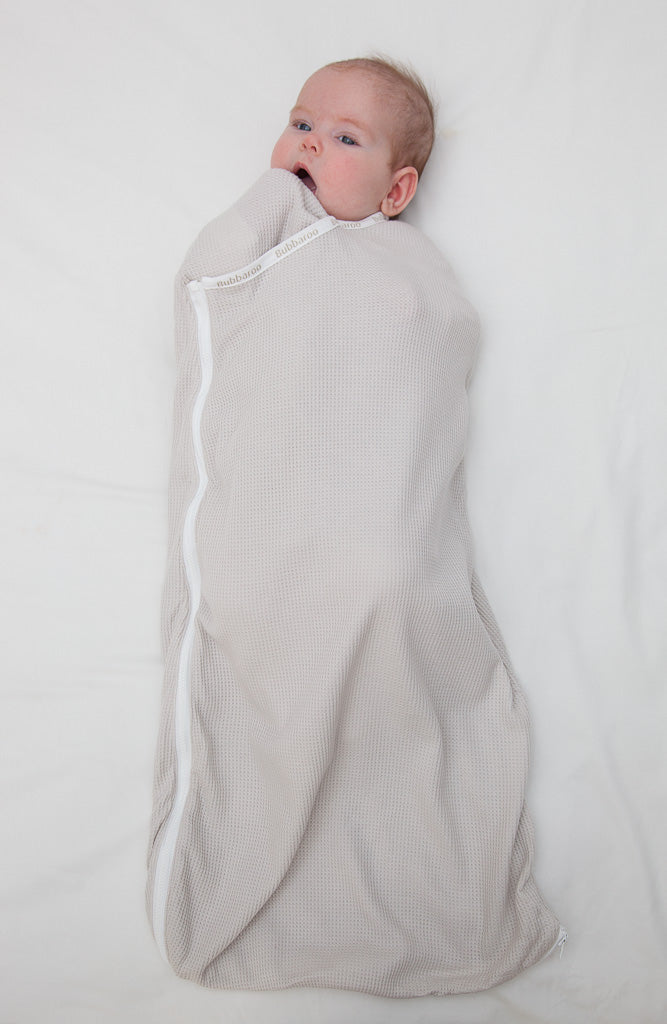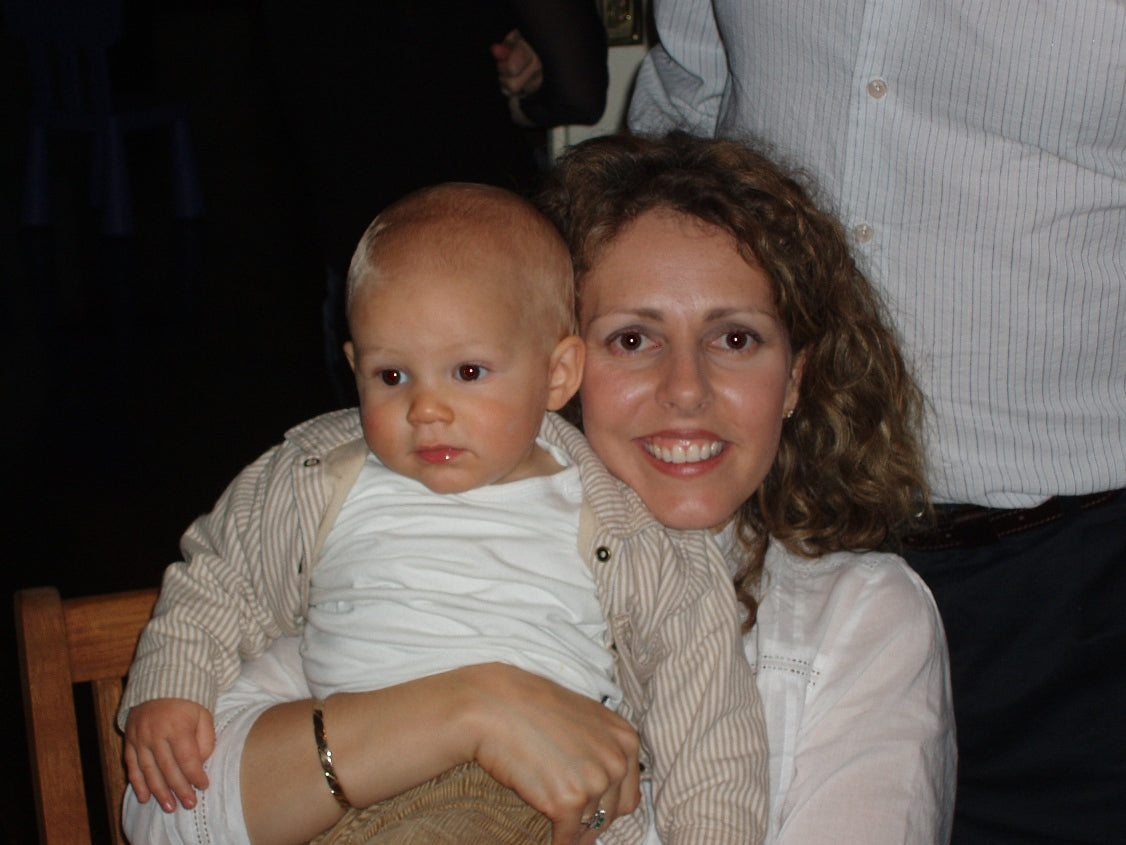A Mom’s Perspective on Baby Reflux & Lack of Sleep

The question a lot of new parents ask when they have an unsettled baby that is spitting up is – how do I know if my baby has reflux? Reflux is a topic very close to my heart! My first child, Jacob, had severe Gastro-esophageal Reflux Disease (GERD) resulting in his failure to thrive. This child was very nearly an only child! My daughter Emily’s reflux was more covert as it was silent.
When Jacob was finally diagnosed with GERD as a baby it was a very challenging time for my husband and me. Not only were we incredibly sleep deprived and learning how to be parents, but to watch helplessly when your baby is in constant distress and ultimately refusing to feed was a very traumatic experience. It took a long time to diagnose my son’s health issues and so my primary objective in sharing my story is to help other parents access the information they need and find physical, emotional and psychological support that is so crucial.
My Story
When my first baby Jacob was born at 41 weeks he came out screaming his lungs out and he just didn’t stop! He was a terrible feeder, at every feed he’d be “fussing”, shaking his head, gulping down air, getting painful wind and then vomiting. Sometimes I’d wonder if he’d kept any of my breast milk down. We stayed in hospital 5 days after his birth and Jacob only just maintained sufficient weight for us to be allowed home. My baby’s distress and breast fussiness escalated as the weeks wore on. He wasn’t gaining weight and I was becoming increasingly anxious.
I didn’t know what a “normal” amount of crying was or a “normal” amount of spitting up was. I just knew in my gut that something just wasn’t quite right. When Jacob was about 5 weeks old I made an emergency appointment with the Pediatrician. The Pediatrician was also initially concerned by Jacob’s weight and distress. He sent Jacob off for blood work and an ultrasound scan to test for Pyloric Stenosis. When these tests came back negative Jacob and I were both admitted to hospital for observation and to have an inpatient lactation consultant appointment.
Unhelpful Comments
The lactation consultant in the hospital yelled at me “you CANNOT breastfeed this baby” I was very upset and burst into tears I felt like a complete and utter failure as a mother. I knew in my heart that it didn’t matter whether I fed Jacob breast milk or formula he would still refuse. He was in pain!
When the Pediatrician found out Jacob had reflux his reaction was that “acid is over-rated” (meaning he didn’t think it was a serious issue)! We were discharged from the hospital after 4 nights with a plan to syringe 5ml guarcol (a horrible food thickener) into his mouth, offering each breast, bottle feeding with my expressed breast milk and then offering formula.
After we were discharged things went from bad to worse. After 5 weeks of no sleep and complete distress Jacob now wasn’t waking up. He was lethargic and was unable to keep anything down. I was beside myself with worry! One Thursday night after yet another visit to another Dr, my husband came home from work and I said we’re taking Jacob to the emergency department at our local children’s hospital. When we presented the ER Doctor was very concerned about Jacob’s weight and we were admitted to hospital immediately.
Jacob’s Diagnosis & Treatment for Baby Reflux
The Doctors, Nurses and Lactation Consultants at our local children’s hospital were nothing short of amazing. They recognized just how much pain Jacob was in and started him on a proton pump inhibitor drug called Omeprazole.
Unfortunately, Jacob’s reflux had gone too far and his esophagus was ulcerated. I was given a number of options to feed Jacob with a nasal gastric tube suggested. The staff supported my decision to continue breast feeding Jacob. I didn’t want Jacob fed through a nasal gastric tube. We experimented with a supply line however, we very quickly learned that Jacob was getting double the volume of breast milk at the same time and created considerable distress for him. My breast milk supply was never an issue, the issue was that Jacob couldn’t keep any milk down. In the end we found that finger feeding was the best option because Jacob could sit upright and be fed my expressed breast milk.

Jacob in his pink elevated crib at our local children’s hospital!
Concerns About My Own Health
The Registrar at the children’s hospital voiced concerns about my own mental health because I was just so emotional, sleep deprived, completely stressed out and anxious. I did regain some of my confidence whilst I was at the children’s hospital with Jacob but there was still a long journey ahead of me!
I felt like a caged animal in hospital but I knew it was where we needed to be. When we were discharged I felt so nervous about going home as Jacob was still in so much pain and still really unsettled. I felt so lonely when we were in hospital with no people visiting during the day. My husband would try to come up at meal times so I could at least go and get some food to eat.
The New Normal

Jacob after being discharged from hospital
It took many weeks for Jacob’s esophagus to repair and for the Omeprazole to work. Jacob would continue to be very unsettled and would arch his back in pain about 20 minutes after a feed.
To make sure I didn’t go completely out of my mind, I tried to get out of the house at least once a day whether it was a walk around the block with Jacob in the pram or Mother’s Group with many towels to wipe up the vomit. Traveling in the car was a very unpleasant experience because he’d scream in distress, in hindsight this was more than likely a sign of his middle ear issues which were yet to be diagnosed.

Jacob’s true personality shining through
I really enjoyed the Mom & Bub coffee mornings at the maternity hospital where I gave birth to Jacob. I had an opportunity to socialize with other new Moms, whilst volunteers looked after your baby. We had the opportunity to talk with midwives and parent education health care professionals. We’d get an opportunity to speak about our week… I think the stories about Jacob and my weeks made everyone feel good! It was great to be able to feel supported by other moms.
Sleep was Key
I think one of the keys to Jacob’s recovery was to get him to sleep and stay asleep so we could all sleep. He couldn’t feed when he was so overtired and distressed. The feeding regime meant that a routine was essential to ensuring sleep – the old feed, play (tummy time), and sleep, recognizing those all-important tired signs. Controlled crying was NEVER going to work for Jacob because it would only exacerbate his reflux and my anxiety. He was in pain and this was his way of telling us he was in pain.
We raised Jacob’s crib with a foam wedge under the mattress – the idea was that this would keep him more upright. I’m not really sure how well it worked as we elevated the crib from very early on and he still went on to be so distressed.
One of the symptoms of Jacob’s severe reflux was a very strong “startle” reflex. He would startle himself awake! He would startle and cry then wake up in distress because of the acid burning his esophagus and/or his middle ear issues. I remember on certain occasions Jacob would startle so severely that he’d tuck his chin to his chest arms and legs rigid with an almighty scream followed by an episode where he’d literally stop breathing, these were called reflux related apnea.
Swaddling Houdini
We would swaddle Jacob with a muslin blanket to try to calm his startle reflex but he’d always manage to escape, I nicknamed him my little Houdini because even though he failed to thrive he was incredibly strong. I searched and searched to try to find a swaddle product but couldn’t believe that there was nothing on the market in Australia. So I decided to create my own swaddle product that simulated a mother’s womb. A swaddle that allowed for natural movement of arms and leg – not a tight strait-jacket but a “pouch” similar to a kangaroo’s pouch. A bell-shaped design allowed babies to frog and kick their legs to ensure healthy hip development. Bubbaroo and the Joey Pouch Swaddle Wrap were born after I was inspired by Jacob. And also a need to settle and calm babies in that all-important Fourth Trimester.
Introduction of Solids
I was advised by the Pediatrician at the children’s hospital to start Jacob on solids at 4 months. In theory, heavier food would stay in his gut rather than refluxing back up. Now rather than “milky” vomit I had the colors of the rainbow – orange, green, pink. Jacob wasn’t really interested in solids. He was interested in getting upright and moving!
At just over 2 months Jacob was rolling during tummy time and was so desperate to sit up he’d do tummy crunches. At 5 months he was sitting up. He was then desperate to crawl – he would whine and get frustrated. There were lots of yoga poses like plank and downward dog and more often than not going backward but then finally at about 5 and 1/2 months, he made it forwards with a hybrid crawl!

Jacob crawling
Grommets for Jacob
We went on vacation when Jacob was about 8 months old. On the flight on the way back home, Jacob became inconsolable! We didn’t know what to do. Thankfully my parents were also traveling with us so we all took turns in holding him and trying to calm Jacob down and distract him – pacing up and down the aisles. Shortly after this episode, I attended a Reflux Support Group meeting. One of the moms witnessed how Jacob was behaving on the breast. He would pull on and off shaking his head. This lovely lady recommended me to Dr Renee Shilkin and phoned her rooms to get me an appointment.
Dr Renee took a complete family history and realized that Jacob had severe middle ear issues. At the time he had very red and bulging eardrums. A tympanometer was used to help in the assessment of Jacob’s middle ear and eustachian tube function. The tympanometer produces a graph called a tympanogram measuring a sound wave as it strikes the eardrum. Jacob’s tympanogram indicated that there was no movement in both middle ears.
Dr Shilkin prescribed a course of antibiotics. She advised that if the antibiotics didn’t clear up the inflammation and blockages then he’d need grommets inserted. We just didn’t know how long Jacob’s ear issues had been going on for, most probably from birth. We also decided to take Dr Shilkin’s advice and remove Jacob from the 1 day of daycare he’d just started. He didn’t need to be catching all the bugs which could irritate his ears, nose, and throat and further exacerbate his middle ears.
We also stopped swimming lessons. He didn’t really enjoy them. Again this was more than likely due to his ears. The things we learn! Jacob featured in Renee’s book “Crying Babies and Beyond” where Renee explores all about her Eustachian Tube Irritation concept. It’s Dr Renee’s theory that babies having the combination of GER and allergy or family history of allergy are at risk of developing Eustachian Tube Irritation (ETI). Both Jacob and Emily had ETI.

Standing with assistance
Jacob’s tympanogram didn’t improve with antibiotics. At 9 months of age Dr Renee referred Jacob to an Ear Nose and Throat (ENT) specialist. At our first appointment the ENT couldn’t believe that Jacob was walking as babies with middle ear issues usually have balance issues. Jacob had grommets inserted at just over 9 months. The ENT surgeon actually came out to speak to me after the operation. The amount of mucous and fluid they drained out during the procedure shocked the surgeon. It’s interesting to learn of a study where researchers found digestive enzymes in the fluid in the middle ears of 83% of the children with ear infections (OME) participating in the study. With concentrations of these digestive enzymes 1,000 times higher than researchers were expecting.
My story may help parents to determine whether their child has reflux however, not all babies are as overt and severe as Jacob’s case. My daughter’s Emily’s reflux was silent but she also went on to have significant middle ear issues and grommets inserted at 7 months!
You may ask yourself how much is normal for a baby to spit up? Could it be reflux? Are you wondering if your baby has a more serious condition? If reflux is under control are there other health issues?
What is Baby Reflux?
It is normal for babies to vomit (also known as posseting or spitting up) milk now and again. In fact, some babies bring up milk quite a lot. Refluxing needs to be distinguished from posseting or spitting up, which is milk overflow. The milk that comes back in these circumstances is fresh undigested milk.
Obvious episodes of vomiting are known as “overt reflux” where small curdy vomits occur after feeds, sometimes for many hours after a feed. Covert or silent reflux is not obvious, contrary to popular thought, silent reflux does not mean that a baby with reflux does not cry. Silent reflux is diagnosed when a baby is believed to have reflux but the physical evidence of refluxing cannot be seen. The baby may well be in just as much pain as a baby who vomits often. They might still be irritable but it could be more difficult to make a diagnosis due to lack of “symptoms”. Silent reflux requires the same treatment as other forms of reflux once it has been diagnosed. Some of the signs that a baby may have silent reflux are:
- “wet sounding” burps
- gulp then chew and swallow
- acid smell on their breath or their saliva smells acidic
- lots of hiccups
- parents can hear or feel the movement of the fluid going up and down while holding baby
Not all babies who have reflux develop or experience the symptoms Jacob experienced such as failure to thrive and Eustachian Tube Irritation (per Dr Renee Shilkin’s theory). Many refluxers can be described as “happy chuckers”. If your baby appears to be developing normally, growing, putting on weight and isn’t in pain, then bringing up a bit of milk should not be too concerning. In fact it’s quite normal. Kirsten Thompson neonatologist at the University of Western Australia has found that “half of babies under 3 months could have reflux to some extent”. It is reassuring to know that it is common for babies to outgrow reflux symptoms by 1 year of age. My kids’ reflux improved remarkably once they were upright.
GERD
Some babies experience a more severe form of reflux in the form of gastro-esophageal reflux disease (GERD) as was the case with my son Jacob. Some symptoms of GERD include, but may not be limited to:
– baby bringing up a lot of curdled milk sometimes for many hours after a feed
– baby might be in pain – crying, bringing up their legs, squirming or arching their back as though they’re in pain. It could be sudden or go on for a long period of time. It could present at any time of the day or night but is more likely to happen after a feed or when the baby is placed on their back
– slow or minimal growth, however, some babies with reflux comfort feed and therefore have normal weight gain
– baby may be irritable including crying, whining or general fussiness for a lot of the day and/or night
– feeding difficulty or refusal to feed
– sleeping problems due to the pain baby experiences
– coughing
– signs of abdominal pain such as waking up and screaming or arching their back
– Baby may be easily distracted when out and about and seem happy but then cry when the distraction is removed
– Baby might be tricky to settle to sleep or show signs of wind or colic
– Recurrent ear infections
All children are different and every baby will exhibit different symptoms, some more than others. It is therefore important to go with your gut feeling if you think that your baby is not well and follow up with a health professional.
What causes Baby Reflux?
Esophageal Sphincter Immaturity
Many babies experience reflux because of a weakness in a valve at the top of the stomach where the oesophagus connects to the stomach. It is called the esophageal sphincter and it opens to let milk in when baby feeds. Generally, over time the muscle will get stronger. Babies are also born with a very small stomach and it takes time for their stomach capacity to grow. Add to the fact that babies spend a lot of time lying down on their back, they drink milk which does not have a lot of weight to it and the fact that their esophagus is quite short and you can see why babies can bring up milk so easily.
Intolerance or Allergy
Cows milk protein allergy/intolerance is the most common to cause reflux. With the benefit of hindsight, I think that dairy may have exacerbated my son’s reflux. Other foods that may cause reflux are eggs, wheat, soy, and fish. Under your health professional’s guidance elimination of dairy or other suspected food could be trialed to see whether this helps ease symptoms in the first instance before medicating. This would mean excluding dairy or the suspected food from the mother’s diet if breastfeeding or if your baby is formula fed switching to a dairy-free or soy free formula.
Tongue and Lip Ties
Tongue and/or lip ties may cause a baby to reflux, also colic symptoms and failure to thrive. The Australian Breastfeeding association defines a tongue tie as:
“Tongue-tie occurs when the thin piece of skin under the baby’s tongue (the lingual frenulum) is very short and restricts the movement of the tongue. The tongue is not free or mobile enough for the baby to attach properly to the breast.”
An upper lip-tie is where a piece of skin under the baby’s upper lip (the labial frenulum) is very short or thick and is pinned too tightly to the upper gum. This can restrict movement of the upper lip preventing it from being able to flange or ‘pull out’.
The surgical procedure called a frectomy is performed to cut the lingual or labial (tissue in the centre of the upper and lower lip) frenum. If you believe that your child has a tongue or lip tie then consult with your pediatrician, midwife or lactation consultant.
How to Ease Your Baby’s Symptoms
During Feeding
– If your baby has feeding issues then these need to be addressed as soon as possible. Find a trusted healthcare professional – Pediatrician, Lactation Consultant or Midwife that has experience and success of getting reflux or distressed babies breastfeeding.
– Positioning during feeding – I found that positioning Jacob in a more upright position definitely helped. For a time we used the football or twin hold so his head was held high and his body lower whilst feeding. When we were finger feeding this allowed him to be upright.
– If a cow’s milk protein allergy or intolerance is suspect then a trial of excluding this from the breastfeeding mother’s diet to see if baby’s symptoms improve.
– If your baby is formula fed you could try a different type of formula to see if this suits your baby’s digestive system better. Preferably a dairy free formula alternative.
– Try adjusting size of feeds and the timing of your feeds. Several smaller feeds throughout the day and night are better than fewer larger feeds. Babies have small stomachs so bringing up milk might be their body’s way of emptying the stomach if they have eaten too much.
– Hold baby upright after feeding. Try for at least 30 minutes so that he has time to try to digest with the help of gravity! You could try a swing or a baby carrier so you’re able to have your hands free.

– Thickened feeds may be used more for bottle fed babies. Jacob was given a thickener through a syringe periodically through breast feeding in the early day. The theory is that the thicker the feed the higher the chance that gravity helps keep it in baby’s stomach. In Jacob’s case I didn’t find that this helped with his reflux and may have contributed to his weight decline as he was “filling up” on something with no nutritional value.
– Raise the head of baby’s crib and pram/buggy slightly . You could try to do this with a towel or foam wedge under the mattress. It should be a slight incline of 30-45° so that there is no risk of baby falling out sideways. Baby should still be sleeping on a flat surface so make sure the rise is even across the entire surface.
– Monitor your baby’s weight to confirm if they are digesting enough milk and gaining weight. After seeking medical advice from your doctor, your doctor may suggest starting baby on solids between 4 and 6 months. The World Health Organisation currently recommends that solids are introduced at 6 months. WHO call this complementary feeding.
– Medication – this is a last resort when all other treatment has not improved the symptoms or when the “wait and see” approach has meant that the reflux has become so severe that there are no other options. Antacids may be given to determine if there’s an improvement in symptoms of reflux. It is important to note that antacids are not suitable for long term therapy.
– Pacifier or Dummy – reflux babies tend to want to suck and it is believed that the sucking increases the production of saliva thereby increasing swallowing. Saliva is alkaline so it may help to neutralize the acid refluxing and provide some relief from the discomfort caused.
– Swaddling – can help to settle down baby to sleep. It’s important that baby is able to get to their hands to be able to suck. The Joey Pouch Swaddle Wrap allows baby to get to their hands without forcing them into any particular position.

Baby in Joey Pouch Swaddle.
– Middle ear issues can go hand in hand with reflux. Make sure that you get your Pediatrician to check your baby’s ears and use a tympanometer to produce a tympanogram. Be aware that middle ear issues can be cyclical so regular checkups are recommended.
When to Seek Help
Reflux can be a challenging and exhausting experience for parents and their babies. Try to get help and seek medical advice as soon as you become concerned about your baby’s health and well-being.
If you notice any of the following then it is recommended to seek further advice as soon as possible:
– baby is not putting on weight
– baby is in pain or irritable during or after a feed or is refusing to feed
– refluxes often
– if your baby is projectile vomiting often then this could be a serious illness and you should seek help immediately
– if there is any blood in your baby’s vomit (may look like dark specks)
– it may help to make a diary of your baby’s feeds including timing and note any signs of reflux such as bringing up milk how long after a feed and how often
Coping with Baby Reflux
You may find it a little frustrating cleaning up vomit all the time. Hey you might even start to smell like milk vomit yourself. If your baby is a “happy chucker” and not distressed then you may not experience the same level of stress as parents with a severely distressed reflux baby.
It’s really hard to cope when your baby is crying and distressed all the time. You want to enjoy your baby but sometimes nothing you do seems to work. I know I felt like a failure and that no one was listening to me. I want you to know that I understand completely what you’re going through.

Jacob turns 1
Below I’ve included some tips that may help you to get through this very challenging time caring for a baby with reflux.
My Top 12 Tips
- My number one tip is — trust your gut instinct “Mama Bear”. You know your baby best. Pediatricians and other healthcare professionals don’t see what is going on when you’re trying to feed or settle your baby for what feels like the 1,000th time that day. If you suspect your baby has reflux then find a healthcare professional that will listen to your concerns and take action. Don’t give up on your baby. Keep going until you find a trusted health care professional.
- It’s important to remember that babies cry for a reason. This is the only way they can communicate with us. Normal healthy babies have different cries indicating they’re hungry, tired, over-stimulated, bored or have a soiled diaper. Believe me when I say the cry of a baby in pain is completely different. A baby in pain may take a long time to learn the different normal communication cries. Babies need physical contact and closeness when pain overwhelms them. Holding them upright may help.
- Please know that you’re doing your absolute best. This is not your fault. It’s important to realize that your baby has a problem. As the mother, you’re fully responsible for your baby so it’s natural that you might think it’s your fault.
- Well-meaning relatives and friends may have many suggestions and comments. What you really need is understanding and a significant amount of physical help. Do not be afraid to ask for help with meals, to do the laundry, watch the baby while you have a few hours of uninterrupted sleep or take a shower. If you don’t have family or friends nearby or they’re unwilling to provide physical help then an investment in a post-natal doula would be worth considering.
- Typically reflux babies are difficult to settle to sleep and wake frequently. Sleep deprivation is a major problem for parents too. Sleep deprivation together with persistent crying of a distressed baby can take its toll. If you’re feeling that you may lose control, place your baby in their crib, close the door and walk away. Phone someone to come and take over so you can take a rest. Unfortunately, more often than not, sleeping problems for your baby won’t resolve until these health issues have been addressed. It could be a long haul so you need to take care of yourself.
- Sleep when the baby sleeps. The sleep deprivation and physical exhaustion of looking after a distressed refluxing baby can be debilitating. Take turns with your partner getting up to the baby. I would go to bed early and my husband would settle the baby until he went to sleep. Even better if a friend, relative or post-natal doula can help out so you can get some sleep.
- Babies are not born with a manual and there are generally no right or wrong answers on how to best handle this. They are all individual, even reflux babies. What works for one may not work for another. It really is a matter of trial and error until you find something that works for you and your family.
- Realize that your situation is tough, as children with reflux can have very high needs. Most people do not understand what you are going through or how to help – this may come out in unhelpful things they say or by not offering support and help. I did listen to everyone’s advice; however, I always did what I felt was right and ALWAYS made choices that were safe for my child. For example, I really wanted to continue breastfeeding when certain family members were getting very upset with me and my persistence with breast feeding. I knew in my heart that breastfeeding would help with Jacob’s reflux.
- Self care is so important. So look after yourself – not only are YOU as important as your child, but who’s there to look after your baby if you fall apart? We’ve lost our villages so you need to look after yourself and create your own village.
- You can drive yourself crazy trying to figure out why today was better or worse than yesterday – “what did I do; what did I eat; maybe if I did this; maybe if I tried that?”. The simple fact is, reflux can be cyclic and some days may just be worse than others, for reasons you may never know. Reflux can flare up when anything stresses the baby – hot humid weather is a common trigger, together with over-tiredness (this is a vicious circle), illness, change in routine, colds, teething, vaccinations etc. Sometimes it can help to know that so that any changes make more sense.
- Talk it over. Don’t bottle your worries or concerns, ring a friend, family member or a support group contact. Talking things over helps to relieve the strain and often helps you to solve problems. A mom at my support group suspected that Jacob might have middle ear issues and shortly after we had the answer to a lot of his health issues.
- Recognize that there will be times you feel more able to cope, and more positive, while other times you may feel overwhelmed. This is completely normal. If you’re not coping please seek help from a healthcare professional.
The good news is that most babies will outgrow reflux over time as their body matures and develops. In fact, most babies will have little or few symptoms by 12 months of age. I have proof that my “reflux baby” is now a thriving, healthy teenager and we have an incredibly close relationship. So hang in there – it does get better!

Teenage Jacob with mom and sister.


